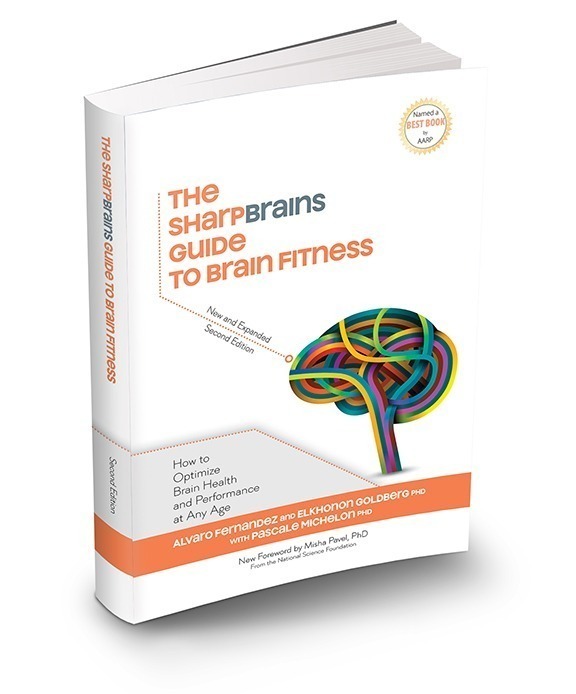Contents
 Foreword from Misha Pavel (2nd edition)
Foreword from Misha Pavel (2nd edition)
Foreword from Gloria Cavanaugh (1st edition)
INTRODUCTION
CHAPTER 1. START WITH THE BRAIN IN MIND
What Does the Brain Do?
What Do Neurons Do?
How is the Brain Structured?
The Brain Throughout Life
Lifelong Neuroplasticity
• How the brain can change at any age – for good, or for bad
• Brain imagining provides examples of neuroplasticity
• Don’t count on miracles
Interviews
• Dr. R. Sylwester – Cognition and brain development.
• Dr. J. Zull – What is learning?
• Dr. M. Posner – What is attention and how to train it.
CHAPTER 2. BE A COACH, NOT A PATIENT
The Future is (Almost) Here
Don’t Outsource Your Brain
• What are my priorities?
• Is this relevant to me?
• Be aware of cognitive biases
The Value of the Scientific Process
• Observational and randomized controlled studies
• The media challenge: BBC versus NIH studies
Interviews
• Dr. R. Bilder – Why and how to change the brain. Meditation is a good example.
• Dr. A. Pascual-Leone – Understanding brain health to better self monitor.
• Dr. W. Reichman – Why Brain Health needs to catch up with Cardiovascular Health.
• Dr. M. Merzenich – How neuroplasticity will transform brain health and mental health.
CHAPTER 3. MENS SANA IN CORPORE SANO
How Does Physical Exercise Affect the Brain?
Staying Fit Improves Cognition
Staying Fit is Preventive
How Much Exercise and What Kind?
Interviews
• Dr. A. Kramer – Why we need both physical and mental exercise.
• Dr. Y. Stern – How do physical and cognitive exercise interact?
CHAPTER 4. YOU ARE WHAT YOU EAT AD DRINK (UP TO A POINT)
Food for Thought
Short-Term and Long-Term Effects of Nutrition
Omega‑3 Acids and Antioxidants
Supplements: Good, Bad, or Ineffective?
Does What We Drink Affect the Brain?
Two Health-Related Factors that Matter: Diabetes and Smoking
Obesity and Cognition
Interviews
• Dr. L. McCleary – A multi-pronged approach to brain health.
CHAPTER 5. OH, THE PLACES YOU’LL GO!
Structural Benefits of Mental Challenge
• Mental activity versus mental challenge
• Challenge but also variety
Invest in Your Cognitive or Brain Reserve
Lifelong Effects of Cognitive Exercise
Education and Occupation are Protective
Leisure Activities to Build Brain Reserve
• Musical training
• Learning a new language
• How about video games?
Interviews
• Dr. Y. Stern – The connection between building a cognitive reserve and delaying Alzheimer’s symptoms.
• Dr. E. Zelinski – Healthy aging and cognitive enhancement.
CHAPTER 6. OH, THE PEOPLE YOU’LL MEET!
Benefits of Social Engagement
Why Would Social Engagement Boost Brain Functions?
What Matters in a Social Network?
Expanding Social Life
• Volunteering
• Social groups
What About Social Media?
Interviews
• Dr. O. Ybarra – Some social interactions, but not all, can boost cognition.
CHAPTER 7. MANAGE STRESS, BUILD RESILIENCE
Positive and Negative Stress
The Brain Stress Response
Stress and Depression
Lifestyle Solutions Against Stress
Meditation: A Capacity-Building Technique To Manage Stress And Build Resilience
Interviews
• Dr. A. Newberg – The value of meditation.
• Dr. R. Emmons – Enhanced happiness and health by cultivating gratitude.
• Dr. B. Steenbarger – Achieving peak performance in high-pressure professions.
CHAPTER 8. CROSS-TRAIN YOUR BRAIN
What is Brain Training?
• How is brain training different from mental stimulation?
• Under what conditions can brain training work?
The Case for Cross-training
Meditation to Train Emotional Responses and Attentional focus
Reframing Thought Processes via Cognitive Behavioral Therapy
Cognitive Training to Optimize Targeted Brain Functions
Biofeedback to Monitor and Enhance Physiological Responses
Top Brain Training Programs, Based on SharpBrains’ Analysis and Survey
• Results from the 2012 SharpBrains Market Survey
• Product Overviews
SharpBrains’ Checklist for Evaluating Brain Fitness Claims
Interviews
• Dr. J. Beck – The link between brain training and weight loss.
• Dr. M. Buschkuehl – Can intelligence be trained?
• Dr. J. Edwards – Improving driving skills.
• Dr. T. Klingberg – Expanding working memory for children with ADD/ADHD.
CHAPTER 9. HOW TO BE YOUR OWN BRAIN FITNESS COACH
How to Prioritize
How to Self-Monitor: Beliefs, Knowledge, Behavior, and Performance
How to Plan
Afterword from Sandra Bond Chapman (2nd Edition)
Appendix I: 55 Important Brain Fitness Facts
About SharpBrains
About the Authors
Acknowledgements
Glossary
References
Index
